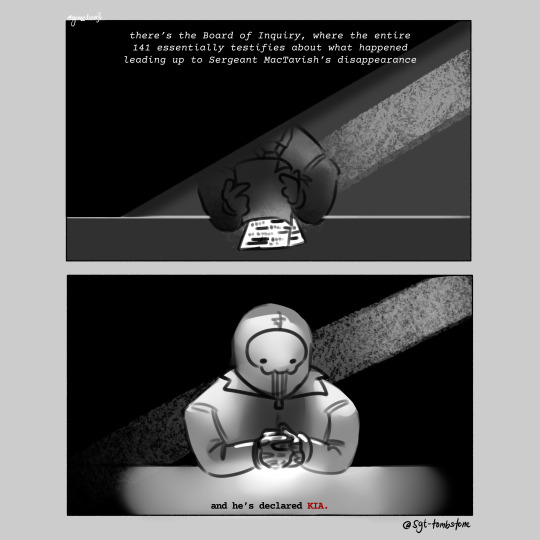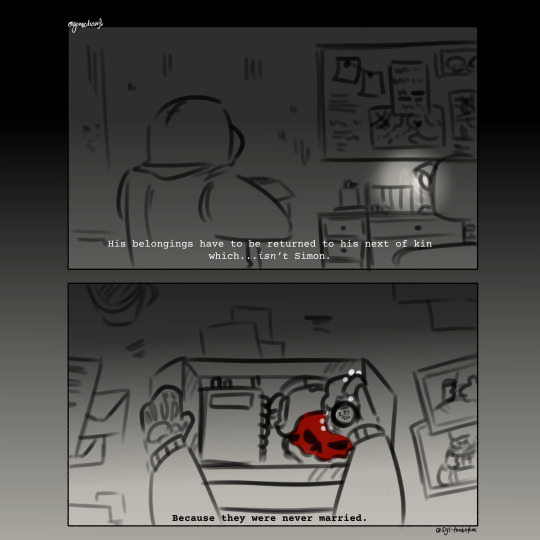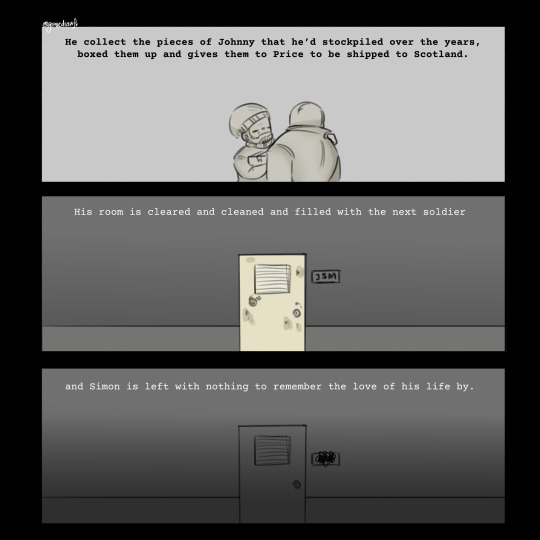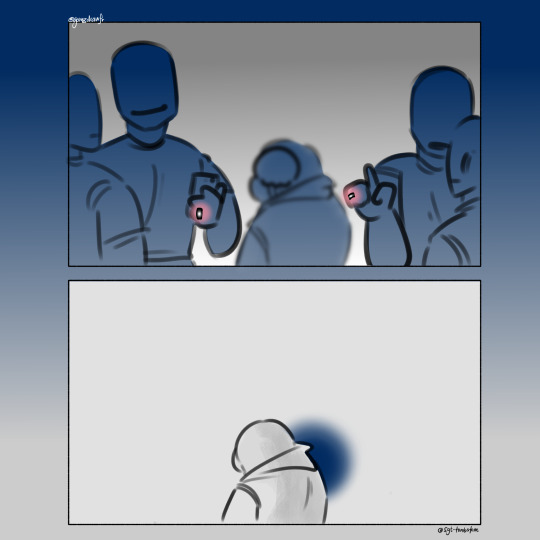#initially didn't want to include text but realize then it might show zero context so yeah HAHA
Explore tagged Tumblr posts
Text
Content Warning: MCD, Angst

Simon Riley has never understood why military personnel get married so quickly.






He had never even bought a ring.

This comic is inspired by @sgt-tombstone's fic, please read it here (thank you for letting me post this once again!)
#not my best work but when I read this back in June it stuck with me for a long time#and I really wanted to draw it out#initially didn't want to include text but realize then it might show zero context so yeah HAHA#gummmyart#doodle#simon ghost riley#john soap mactavish#soapghost#ghostsoap#ghoap#angst#call of duty#cod
417 notes
·
View notes
Text
I think maybe the reason so many Stede metas hit wrong for me is it seems like people are going about analyzing his character backwards. Rather than starting by looking at his words and actions and the context they occur in, then from there inferring what his motivations are and his character traits and flaws, then asking what that might say about the broader messages and themes, it feels like they're starting from the point of Stede is a wealthy white man in a show that is anti-patriarchy, anti-white supremacy, and anti-class/wealth inequality and from there having a sort of mental list of the kinds of character traits/flaws and motivations you would expect to see from that type of character in that type of show, and then applying those things to his words and actions. Which I realize sounds very specific and I don't think people are doing it intentionally, but it would explain a lot of the things I've seen, including:
Characterizing Stede as a neglectful father and husband pre-Revenge, despite there being little to no evidence to the former, and with regards to the latter there is plenty of evidence, including a direct statement from Mary, that they were both at fault for the problems in their relationship
Suggesting that Stede welcomed Nigel aboard the ship despite his crew's protests and the significant discomfort it caused for the black crew members out of a desire to impress Nigel/gain social status, ignoring the fact that Nigel is one of Stede's childhood abusers who invited himself aboard at gunpoint (canonpoint) while having the full legal right to back up his threat
He is frequently described as being selfish, even in situations where there are explanations for his actions -- his proposal to Mary that they all go live on a ship fails to account for the others maybe not being as excited by the prospect, but it was made in a genuine good faith belief that it would be helpful for them as a whole family -- or even when there is zero reason to believe he was behaving self-servingly at all -- I've seen people suggest he was selfishly refusing to share his marmalade with the Swede when he got scurvy, despite there potentially being any number of explanations for the marmalade not coming up, not the least of which that it would not have actually served as an effective cure
Describing Stede as being very passive aggressive, especially in episode 10, when the definition of passive aggression he gives in episode 5 makes it pretty clear he does not have a totally accurate and complete grasp on what passive aggression even is, and his attempts at using passive aggression in both episode 5 and against Calico Jack make it clear that he lacks the subtlety to be truly effective at it
His fancy things, especially his clothes, are categorized as being a marker of his wealth, and therefore things that need to be gotten rid of, when the text makes it clear that these are all ways of joyfully being and expressing himself that he had actually been frequently deprived of when he was actually living the life of a wealthy gentleman
He's also been characterized as someone who desires/expects power and control with his arc being to let go of that need, despite the fact that from the very first episode it is clear that he wants to run his ship in a supportive and collaborative way, see Wee John saying he wants them to have a flag, and Stede immediately responding by facilitating them each getting an opportunity to create a flag with the intention of them all collectively deciding which one they want to use afterward. Even in times when he is controlling, looking at the context makes it clear there are motives for it unrelated to Stede desiring control for control's sake. For example when they're initially brainstorming their fuckery, Stede shuts down everyone else's ideas, but from the context it's clear this is arising from a deep anxiety over doing it right, especially after Ed expressed that he didn't think Stede could do it, and his real belief that all the ideas put forth were bad, either because they genuinely weren't scary or because they were more slasher horror and Stede thinks they need to do psychological horror presumably because that was what Ed did. It was still controlling and he still needed to apologize, but it was controlling from a place of deep emotional investment in this particular project, not from a broader desire for control.
And then my favorite two examples that I've ever seen because they are so off the walls bonkers there is no way they could possibly be the result of anything but a bad faith reading. When Stede gave his crew a salary and read them bedtime stories, that was him perpetuating the white supremacist patriarchy because a) paying their crew a salary is what the Navy does and b) the bedtimes stories were obviously an attempt by him to reassert the role of patriarch that he failed at in his own family.
Stede does have character flaws. In fact he has a lot of really interesting ones. He's self-centered (as in, fails to consider others, not prioritizes himself over others); he's bad at reading social cues (which is more of a flaw in a narrative sense than a moral one, but still applies here); he's unaware of the extent of his privilege; he is in turns overconfident and deeply unsure of himself; he at times struggles with accepting blame, especially in the midst of a confrontational situations; he's still learning to balance being allowed to advocate for himself while being considerate of others. These just generally aren't the flaws that are stereotypically associated with a wealthy white man, so when you go in starting from that lens, you miss seeing what's actually there.
178 notes
·
View notes